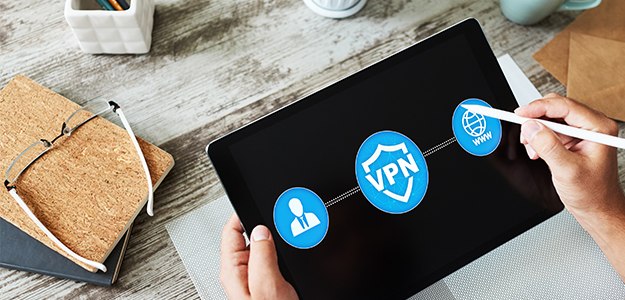Modern-day VPNs are quite versatile and can protect up to 10 simultaneous connections. With ExpressVPN, you’ll only be able to protect three devices, but 5 is the average number on the market. In addition, all major platforms are always supported, including Win, Mac, Android, iOS, and Linux. However, if you install a VPN on router, you’ll be able to cover significantly more devices at the same time.
Furthermore, by installing a Virtual Private Network directly on the router, you’ll free yourself from doing the same routine over and over again. That’s especially true for people that own multiple devices and don’t want to download and install a VPN on every single one of them. Let us go ahead and talk more about all the benefits and drawbacks.
Do You Need a VPN Router?
If you only own a desktop computer and one mobile device (like a Smartphone), a router VPN won’t really improve your situation that much. But if you’ve got a big family with dozens of gadgets, we highly recommend installing the VPN of your choosing on the router.
Like we just said, that will save you a lot of time. Secondly, you won’t have to purchase protection for multiple connections, as the best VPN for router will keep all of your devices secure 24/7.
Yes, it all comes down to your current situation and personal needs. Most users think that it is a very complex process; others even believe that it is illegal. We are happy to say that no law out there prevents a user from installing a VPN on router and protecting the entire network. And, there’s nothing hard about this: all you’ll have to do is carefully follow the instructions.
Benefits Of Installing A VPN On Router

For users that think saving money and time aren’t big enough reasons to install a VPN on their routers, here’s a list of more pros:
Protection For Non-Supported Devices
First of all, not every single device out there supports a VPN, but they still need protection. For example, if you own a gaming console (like PS4 or Xbox One), that router VPN will be a great way to protect yourself from hackers trying to steal your personal data.
The Virtual Private Network will equally secure smart TVs, streaming boxes, and pretty much every other device that is on the network. Just imagine: you’ll be able to protect the entire network by going through with this process one single time.
While home users are only getting used to this idea, offices, and business around the world have already embraced this concept and are using it daily.
Protection For Unlimited Connections
Security, privacy, and access to geo-restricted content on your phone, PC, and tablet – that’s what you’ll get by installing a router VPN. There are absolutely no limitations regarding the number of simultaneous connections – the VPN will be able to handle everything you throw its way.
Whenever you have friends over, they won’t have to ask for your account (which, by the way, is forbidden): their devices will be protected as well!
No Need To Memorize Dozens Of Passwords
For many users, that is a big problem: they forget the passwords to various accounts. As you can imagine, that won’t be a problem if you go ahead with the “install VPN on router” routine.
Furthermore, it’s not rare for people to forget to switch the VPN on when they use the Internet. With this approach, you’ll have to log in once!
Drawback Of Using A VPN Router

While using a VPN router is an excellent idea and provides an impressive list of pros, there are still some downsides that we need to talk about right now. Make sure to carefully go over the benefits and drawbacks first before deciding whether this will be a good thing for you or not. Here is the list of the cons:
A VPN Router Can Be Expensive
What that means is regular (baseline) routers aren’t always compatible with a VPN. You’ll need to spend more money to be able to run a Virtual Private Network on a router.
Alternatively, if you’re up for it, you can download new firmware and install it on a mainstream router. But, again, there are many compatibility issues, and you might even end up damaging the device.
Therefore, if you’re thinking about purchasing a router, it would be a good idea to invest in a VPN-ready one. While it’s not very hard to update the firmware, it does require some basic knowledge; also, your guarantee won’t cover any damages that might follow after an unsuccessful try.
Server Load Will Be Higher
Speed, along with performance stability, is critical, especially for streaming. And with numerous devices connected to the same network, you might experience some stability drops. In most cases, a close-by server from a decent VPN will be able to handle the additional load. But, keep in mind that connection speed will be lower.
The ISP also matter a lot; it will be a good idea to run your Internet provider through a series of tests before thinking about buying a VPN router. On average, a decent combination of a VPN and an ISP won’t have any problems connecting and security up to 10 devices at once (unless you’re downloading torrents on all of them, of course).
It Won’t Be As Easy To Switch Between Servers
If you’re a fan of Netflix, and, say, BBC iPlayer, then you probably have several go-to servers that you switch between regularly. On a PC or a phone, connecting to a different server takes two seconds. Sadly, a VPN router isn’t nearly as flexible, and the list of servers is usually limited by those you picked during configuration.
To switch to a different server, you’ll need to enter the router’s interface, and that will take you a lot of time (compared to just a couple of clicks/taps). Ease of use isn’t something VPN routers are known for. Some models do allow the user to set up several servers, but, again, they can’t compete in that regard with a VPN client/app.
Types Of VPN Routers
As we’ve already discussed, not every single router on the market is up for this task. To put it simply, you won’t be able to install VPN on router unless they are fully compatible.
Checking the router’s manual on the official website or reading about it on Google is an excellent way to start. If you got your router as part of a deal with the ISP, it most likely wouldn’t work (these devices are usually a combination of a modem and a router).

To avoid confusion and frustration, you should never try guessing. Most routers sold at official stores don’t come with pre-installed VPNs; others don’t support the installation of a VPN in the first place. Read the following information carefully to learn about your options and to make the right decision:
A Router Than You Can Flash on Your Own
The term “flashing” means updating the firmware (OS) of your router so that it can work with a Virtual Private Network. That is the most complicated option and can, potentially, cause the device to malfunction. Always check whether your router model is compatible with the update. Tomato and DD-WRT are the most popular and stable types.
These are 100% free, third-party firmware with their own strong and weak sides. Here’s what the two have in common:
- Advanced level of security
- Extended wireless range and a regulated bandwidth
- Compatibility with several VPN protocols
And now let us look at the differences between Tomato and DD-WRT and see which one is a better choice for you.
DD-WRT:
- Supported by more routers
- With it, you can distantly access your network
- Allows you to adjust the strength of the signal (Wi-Fi)
- Prioritizes certain types of traffic
Tomato:
- Advanced bandwidth monitoring
- Can run two servers simultaneously
- The user interface is more straightforward and friendly
- Overall better compatibility with different VPNs
A Pre-Configured Router
That is the most user-friendly option. You won’t have to do anything techy – everything is taken care of already. A pre-flashed router is one with updated firmware, a “ready-steady” device that you can use to protect your network. It will cost you more than just a regular router.
Along with the fully configured device, you’ll also get benefits like a performance improvement and encrypted plug-and-play. Again, a pre-configured (also known as a “pre-flashed”) router is the most expensive choice. With it, you get ease-of-use and can choose which VPN should be configured by the vendor.
A VPN-Compatible Router
It is like the golden mean of the previous two options. You’ll still need to install a VPN, but the firmware will already be updated. Moreover, you’ll save some money on the purchase. All you’ll have to do is use your login/password, select a server with the VPN, and that’s it.
A quick note: don’t forget to check whether the router supports OpenVPN or not. It is the most popular, secure, and recommended protocol. OpenVPN is the go-to protocol not only for routers but also for regular devices. For the average user, a VPN-compatible router is the most reasonable pick.
How To Choose A VPN Service For Router
The most important factor: it must be compatible with a router; you won’t have any trouble with NordVPN, or, say, ExpressVPN. On the other hand, VPNs like Hotspot Shield aren’t supported by any router on the market. Speed and stability are the main concerns. Security and privacy are also important, along with decent customer support.
Visit the official website of a Virtual Private Network you like to see whether it can be installed on a router or not.
What About Windscribe?
Windscribe is one of the few providers that can be easily installed on a router. There are detailed and user-friendly installation guides on their website. Tutorials will help you install Windscribe on DD-WRT, Tomato and Asus flashed routers. Pre-configured options are also


